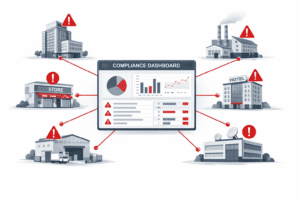I. Introduction
In the world of business, success often hinges on the minutiae — the finer details that elevate a company from merely good to truly great. One such detail, often shrouded in the periphery of business strategy, is the concept of benchmarking laws. These are not just obligatory legal hurdles but are key indicators and drivers of excellence. Benchmarked compliance can mean the difference between thriving and barely surviving in today’s market. By setting a context for how these laws underpin every successful enterprise, we begin to understand why disregarding them might be a silent culprit stunting your business’s growth.
II. Understanding Benchmarking Laws
A. Definition of Benchmarking Laws
Benchmarking laws are a set of legal and regulatory standards that mandate a company to periodically measure and compare its performance against recognized best practices. These laws are designed to ensure companies are operating at an optimal level by identifying benchmarks that are critical to industry and customer expectations. They exist to push companies towards peak performance and are often found in industries where safety, quality, and efficiency are of paramount importance.
B. The History and Origin of Benchmarking Laws
Benchmarking as a concept has its roots in the practices of the manufacturing sector during the early and mid-20th century when quality and efficiency began taking center stage. However, it wasn’t until the 1979 publication of “Xerox Corporation’s ‘Leadership Through Quality’ initiative” that benchmarking became formalized as a business practice. As a result, laws and policies began to crystallize around the idea, especially in areas where performance had a direct impact on public interest, such as energy benchmarking in the energy sector.
III. The Importance of Benchmarking Laws in Business
A. Key Benefits of Benchmarking
Implementing benchmarking within a business framework is more than a compliance exercise; it offers an array of tangible benefits. The benefits of benchmarking include improved operational efficiency, higher quality products or services, and enhanced customer satisfaction. By comparing your business processes to those of the top performers in your industry, you uncover gaps and opportunities for improvement. Benchmarking can lead to innovation as organizations strive to not just match, but exceed the benchmarks set by their competitors.
B. Maintaining a Competitive Edge
Stagnation is a threat to any business and competitive benchmarking acts as a safeguard against it. By systematically comparing your business against others in the industry, you are better equipped to adapt to changing market conditions, adopt new technologies, and refine your strategic focus. This practice keeps you agile and responsive, qualities that are essential for maintaining and enhancing your market position.
C. Aid in Decision-Making Processes
Benchmarking laws contribute significantly to the decision-making process by providing a factual and objective basis for making strategic decisions. They allow businesses to set realistic goals and make informed decisions regarding resource allocation, process improvements, and strategic investments. This leads to a more strategic approach to business growth, rather than one based on intuition or speculative trends.
IV. The Consequences of Ignoring Benchmarking Laws
A. Risks Associated with Ignoring These Laws
Ignoring benchmarking laws can lead to a complacent mindset where businesses fail to recognize inefficiencies and areas of underperformance. Without the clear standards set by benchmarking, companies may inadvertently allow their services or product quality to deteriorate. Over time, this can result in declining customer satisfaction, reduced market share, and ultimately, a tarnished reputation that may prove difficult to rehabilitate.
B. Legal Implications and Financial Losses
Compliance with benchmarking laws is not optional in many industries – it is a legal requirement. Failure to comply with these regulations can lead to severe consequences, including significant fines, legal disputes, and operational disruptions. Moreover, financial repercussions aren’t limited to penalties; they also encompass the opportunity cost of failing to improve processes and systems, which can result in higher operational costs and lower profitability in the long run.
V. How to Implement Benchmarking Laws in Your Business
A. Steps to Integrate Benchmarking Laws
Integrating benchmarking laws into your business begins with a thorough analysis of current practices against the standards set forth by regulatory bodies or industry norms. The benchmarking process typically involves defining performance metrics, collecting data, analyzing it, and then implementing improvements based on findings. It is a cyclical process, wherein benchmarks are regularly updated to reflect evolving industry standards and internal goals.
B. Role of Management
Management plays a critical role in endorsing and promoting benchmarking efforts. Leaders must communicate the importance of benchmarking laws and foster an environment where employees understand and embrace these standards. Management’s commitment to regular reviews and continuous improvement is essential to embed the benchmarking process into the company’s culture.
C. Tips for Adoption
To encourage widespread adoption of benchmarking practices, companies should provide comprehensive training and resources to their employees. Recognizing and rewarding departments or teams that adhere to benchmarking standards can also be instrumental. It’s critical to integrate benchmarking into the day-to-day operations so that it becomes second nature to the business’s way of functioning.
VI. Conclusion
The importance of benchmarking laws in fostering business growth and development cannot be overstated. These laws are not mere compliance checkboxes but foundational elements that can fuel business innovation and competitive advantage. By adhering to these benchmarks, businesses ensure they are not only meeting the minimum standards but are also on a path of continual improvement and excellence.
VertPro.com serves as a resourceful platform for property owners and managers seeking to enhance their buildings’ energy efficiency. The site offers a range of services, including Commercial Energy Audits, Benchmark Compliance consultancy, and a Construction Marketplace. At the heart of VertPro® is a suite of SaaS technology-based solutions designed to assist in navigating the complexities of Energy Benchmarking and Energy Audits/RCx Plus, while ensuring adherence to over 60 Energy Benchmarking and Energy Efficiency Laws across the country.
For those looking to improve their property’s energy usage and operational value, VertPro.com provides a diverse array of tools and information. The site aims to facilitate a better understanding of energy efficiency practices and legislation, helping building owners and property managers make informed decisions about their energy strategies while complying with all energy ordinances and laws.

















